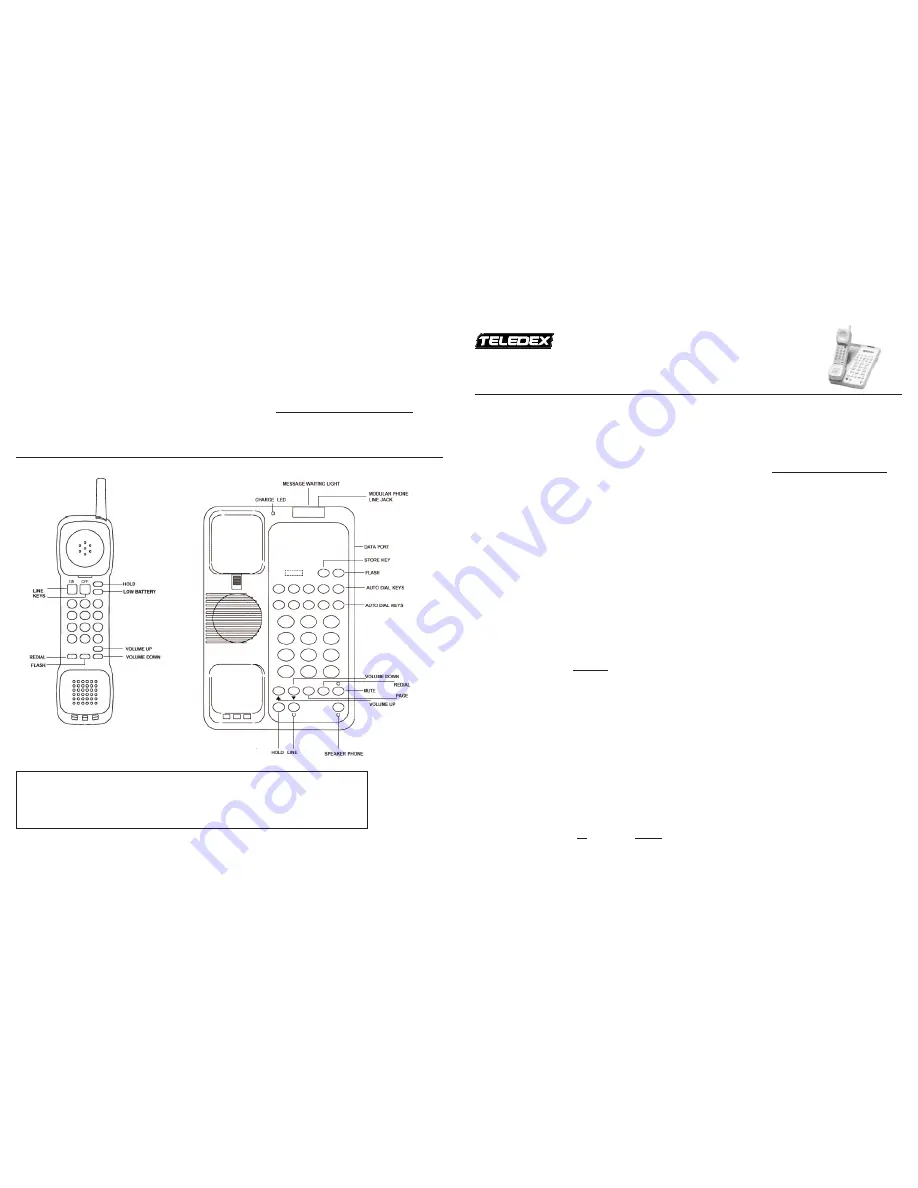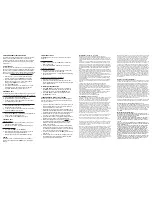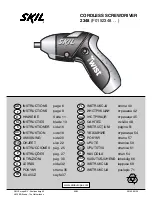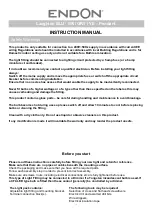
INCLUDED IN YOUR PACKAGE
Cordless Handset
AC Adapter
Base Unit
User Guide
Battery Pack
RJ-11 Line Cord
Rubber Battery Screw Cover
RJ-45 Cable
Phillips Screw
Clear Plastic Overlay
PREPARING TO USE THE DCT1900 SERIES
1. Prepare to install the battery into the cordless handset by
firmly pressing down on the top of the battery cover and
sliding it off. If cover is secured with a screw, remove the
screw first.
2. Locate the lightly embossed numbers “1” and “2” on the
battery’s plastic connector.
3. Insert the battery connector into the handset’s connector
with the embossed numbers facing up.
Note: The handset may “beep” when the battery is connected. This is not
an indication that the telephone is ready to use. To obtain optimal perform-
ance of the telephone, be sure to charge the battery for 15 to 20 hours
.
4
. Replace the battery compartment cover and retaining screw.
5. Insert the provided rubber screw cover.
6. Turn the telephone base so the back panel is facing you.
Insert either end of the RJ-45 cable into the jack on the back
of the telephone labeled
LINE
.
7. Insert the other end of the cable into the jack on the AC
adapter labeled
PHONE
.
8. Insert one end of the RJ-11 line cord into the jack on the AC
adapter labeled
LINE
.
9. Insert the other end of this line cord into a telephone jack.
10. Plug the AC adapter into an unswitched electrical outlet.
11. Once your telephone is connected, remove the plastic
overlay and place the paper faceplate over the keys. Replace
the plastic overlay by hooking the tabs on the overlay into
the recessed slots located on both sides. The overlay is
easiest to insert when the left or right side tabs are inserted
first, and the middle of the overlay is slightly bowed to allow
for insertion of the other tabs.
12. Place the cordless handset on the base unit.
CHARGING THE BATTERY
The rechargeable battery must be fully charged before using the
phone for the first time. It is recommended that that battery pack
be charged for approximately 15 to 20 hours, without interruption,
before use. To charge the battery, place the handset, keypad down,
in the base unit. Make sure the
CHARGE
LED on the base lights.
If the LED does not light:
1. Ensure that the AC adapter is plugged in.
2. Ensure that the AC adapter is not plugged into a switched
electrical outlet.
3. Ensure that the handset charging contacts at the bottom of
the handset are making good contact with the base unit’s
charging contacts.
CLEANING THE BATTERY CONTACTS
To maintain a good charge, it is important to clean all charging
contacts on the handset and base unit. Use a pencil eraser or
other contact cleaner.
Do not use any liquids or solvents.
BATTERY SAFETY INSTRUCTIONS
1. Use only Teledex-approved battery replacements.
2. Dispose of used batteries according to local codes pertaining
to rechargeable batteries.
3. Do not dispose of batteries in fire, as they may explode
4. Charge the telephone's batteries only while in the telephone
handset, and only by using the telephone base unit to charge.
Do not attempt to remove the batteries and charge them in
a separate charging unit.
5. Do not short-circuit the battery pack, as this may cause it to
explode or catch fire.
HANDSET/BASE REGISTRATION PROCEDURE
This procedure establishes an exclusive link between a specific
handset and base, thereby allowing no other access to this
specific base. To accomplish this procedure, place the handset
on the base in the charging position. The
LINE
indicator will
blink while the process is occuring. This process occurs each
time the handset is placed on the base in the charging cradle.
ADJUSTING THE RING VOLUME
The up and down volume keys will adjust the ringer volume of
the telephone. Additionally, the DCT1900 series telephone has
an optional “courtesy” ring mode, wherein the ring volume
begins at the lowest setting, then automatically rings louder
with each successive ring during an incoming call. To select the
courtesy ring mode, follow these steps:
Press the
FLASH
key; then the
4
key; then the
STORE
key; then
the
1
key.
To return to regular ring mode: Press the
FLASH
key; then the
1
key; then the
STORE
key; then the
1
key.
ADJUSTING SPEAKERPHONE VOLUME
The speakerphone has eight (8) levels. To adjust speakerphone
volume, locate the volume up/down keys, located on the front
surface of the phone below the keypad. With the speaker active,
press the “down” arrow key to decrease the volume level, and
press the “up” arrow key to increase it.
- IF THE PRODUCT HAS BEEN DROPPED OR THE CABINET HAS BEEN DAM-
AGED.
- IF THE PRODUCT EXHIBIT A DISTINCT CHANGE IN PERFORMANCE.
10. AVOID USING A TELEPHONE (OTHER THAN A CORDLESS TYPE)
DURING AN ELECTRICAL STORM. THERE MAY BE A REMOTE RISK OF ELECTRIC
SHOCK FROM LIGHTNING.
11. DO NOT USE THE TELEPHONE TO REPORT A GAS LEAK IN THE
VICINITY OF THE LEAK.
PLEASE SAVE THESE INSTRUCTIONS
DCT1900 SERIES DIAGRAM
DCT1900 SERIES USERS GUIDE
1.9 GHz DECT Single-Line Digital Cordless Telephone
Part Number 600-0480-77 Copyright © 2006 Teledex LLC. ALL RIGHTS RESERVED.
Telephone
(408) 363-3100
(800) 794-8353
Internet
www.teledex.com
store.teledex.com
Mailing Address
6311 San Ignacio Avenue
San Jose, CA 95119 USA
CONTACTING TELEDEX
8. TO REDUCE THE RISK OF ELECTRIC SHOCK DO NOT DISASSEMBLE THIS
PRODUCT. BUT TAKE IT TO A QUALIFIED SERVICE FACILITY IF
SERVICE OR REPAIR WORK IS REQUIRED. OPENING OR REMOVING COVERS
MAY EXPOSE YOU TO DANGEROUS VOLTAGES OR OTHER RISKS. INCORRECT
REASSEMBLY CAN CAUSE ELECTRIC SHOCK WHEN THE APPLIANCE IS SUBSE-
QUENTLY USED.
9. UNPLUG THIS PRODUCT FROM THE WALL OUTLET AND REFER
SERVICING TO QUALIFIED SERVICE PERSONNEL UNDER THE FOLLOWING CON-
DITIONS:
- WHEN THE POWER SUPPLY CORD OR PLUG IS DAMAGED OR FRAYED.
- IF LIQUID HAS BEEN SPILLED INTO THE PRODUCT.
- IF THE PRODUCT HAS BEEN EXPOSED TO RAIN OR WATER.
- IF THE PRODUCT DOES NOT OPERATE NORMALLY BY FOLLOWING THE
OPERATING INSTRUCTIONS. ADJUST ONLY THOSE CONTROLS THAT ARE COV-
ERED BY THE OPERATING INSTRUCTIONS, AS IMPROPER ADJUSTMENT OF
OTHER CONTROLS MAY RESULT IN DAMAGE, AND MAY REQUIRE EXTENSIVE
WORK BY A QUALIFIED TECHNICIAN TO
RESTORE THE PRODUCT TO NORMAL OPERATION.




















